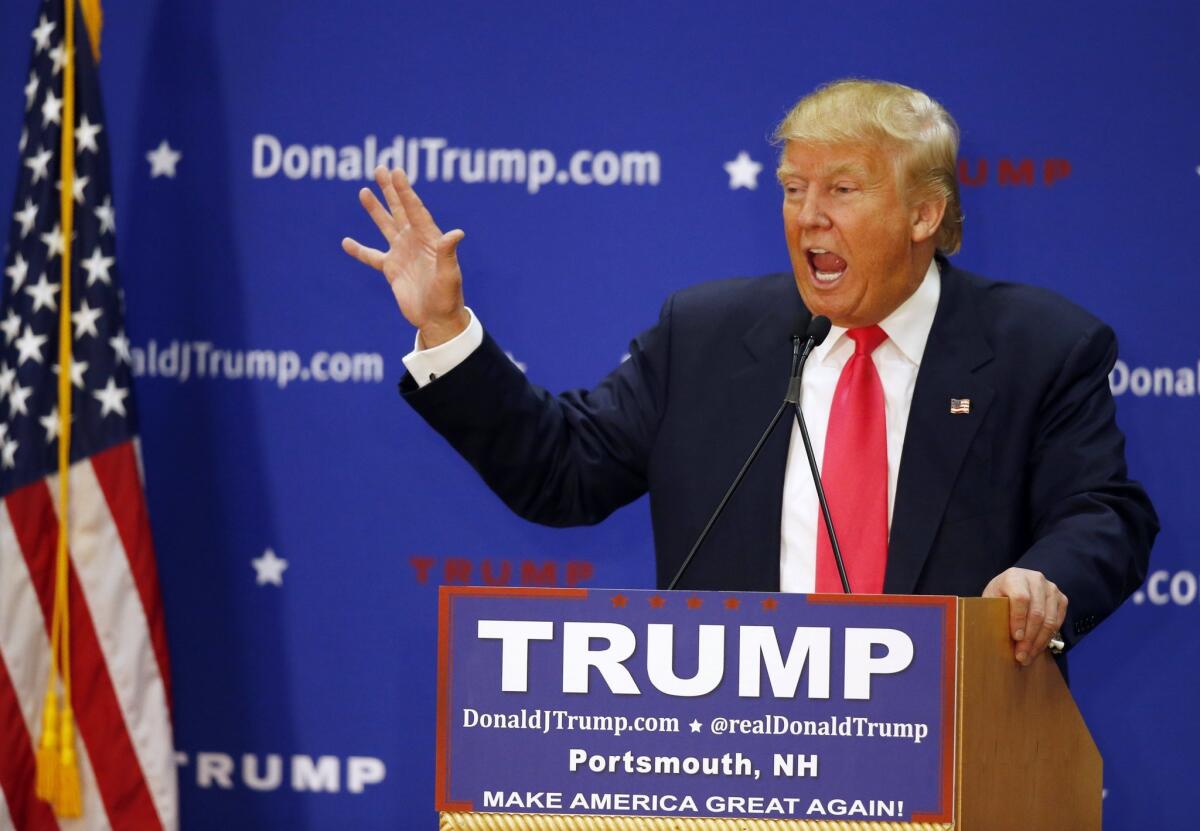Analysis: As New Hampshire primary nears, nasty campaign ads portray a battle for the country’s soul

Donald Trump speaks at a rally at Great Bay Community College in Portsmouth, N.H.
Reporting from Manchester, N.H. — The villages and towns of New Hampshire are as scenic as ever, the people as friendly as can be. The unemployment rate is 3.1%, about a third lower than the national rate. It seems an unlikely place for the apocalypse.
Yet that – or something close to it -- is the threat that pours forth from Republican politicians careening across this state, and the advertisements blasting from the state’s televisions.
“There is an assault on everything we stand for,” says Donald Trump’s newest ad here.
TRAIL GUIDE: All the latest news on the 2016 presidential campaign >>
“After seven long years of this president, we feel our country slipping away,” Sen. Marco Rubio of Florida says in his newest ad.
“Economic calamity ... is befalling our nation,” Sen. Ted Cruz of Texas says in his ad.
It is that kind of election year, here and elsewhere.
There are occasional glimpses of hope, to be sure, but the election is suffused with nasty campaign ads and tough denunciations of the country’s state of being.
It is not that the country is suffering -- it is suffering enormously, and everywhere. It is less the election of a new president, the candidates suggest, than a battle for the country’s soul.
It is a campaign aimed at the angry and the aggrieved.
The master of apocalyptic political speech is Trump, who has fanned voter concerns into a depressed froth as he campaigns across the state.
“Christianity is under siege, the 2nd Amendment is under siege; so many things are under siege,” he declared Thursday at the Exeter Town Hall.
Join the conversation on Facebook >>
According to Trump, nearly everything is going wrong, all the time, due to politicians.
“We’re in big trouble because we’re going in the wrong direction,” Trump said. “The economy is terrible; our trade with foreign countries is horrible. They’re taking it away from us.… We are being decimated on trade, we’re being decimated by China, Japan, every single country we do business with, and it’s never going to change with these politicians.”
For good measure, he added later that “we’re being beaten in so many different ways … all the other countries in the world are ripping us off. And by the way, ripping us off and don’t respect us and mock us.”
That sort of approach gains steam from the broad animosity among Republicans for President Obama — if he is running the country, it must be nearing collapse. But it also reflects the remnants of an economic recession that deeply shook many in New Hampshire, including the blue-collar white voters at whom many of the candidates are aiming their messages.
The current low unemployment rate masks that continued concern, according to University of New Hampshire political scientist Dante Scala.
“It’s a tale of two New Hampshires,” he said. “Your level of education probably has a big part to play in how well you weathered the Great Recession. Especially if you’re 30-something or 40 when it hit, even if you didn’t lose your job, it was the first big economic uncertainty in your adult lives. It left some scars in that regard.”
Trump, who leads in Republican polls here, days before the Feb. 9 primary, may be the ranking expert in playing on those fears. But other candidates are making the same arguments.
In a speech in Henniker on Wednesday, Cruz asked supporters to pray daily to “father God … to pull us back from the abyss.”
“We have faced the abyss before, and the American people came together and pulled this country back,” he said.
Cruz, who cast the coming election as an “inflection point” in history, was particularly scornful of Obama’s handling of the economy. (The unemployment rate was 8.3% his first month in office, peaked at 10% a few months later and is 5.0% now.)
“It is a failed economic plan,” he said.
Rubio burst into the presidential campaign as the optimistic banner-carrier of a new generation. But he, too, speaks as if the country is about to fall off the cliff. The election, he said earlier this week in Exeter, is “a referendum on our identity” after the tenure of Obama, whom he called a “terrible commander in chief.”
His voice rose in anger at times, matching the sentiments of some in his audience, or so he suggested midway through the speech.
“You have a right to be angry,” he said.
Twitter: @cathleendecker
See the most-read stories this hour >>
ALSO
Why young feminists are choosing Bernie Sanders over Hillary Clinton
Labels, smears and other takeaways from the Democratic debate
Presidential race plays out in Congress: Which candidates do California’s members support?
More to Read
Get the L.A. Times Politics newsletter
Deeply reported insights into legislation, politics and policy from Sacramento, Washington and beyond. In your inbox three times per week.
You may occasionally receive promotional content from the Los Angeles Times.











